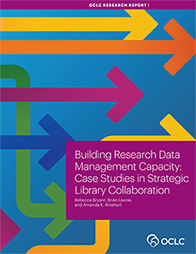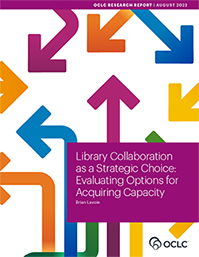Library Collaboration in RDM
This OCLC Research project aims to help academic libraries make intentional, strategic choices about collaboratively sourcing RDM capacities.
Sourcing research data management (RDM) capacities through multi-institutional collaborative arrangements involves assessing benefits and costs. Academic libraries need to be able to make informed choices about when to source RDM capacities through collective effort, and when to choose an alternative sourcing arrangement. Library Collaboration in RDM, an OCLC Research project, aims to help academic libraries make intentional, strategic choices about collaboration in the RDM space and beyond.
As Lorcan Dempsey recently observed, “it is not simply more collaboration that is needed – it is a strategic view of collaboration. . . . There should be active, informed decision-making about what needs to be done locally and what would benefit from stronger coordination or consolidation within collaborative organizations.”
This is the starting point for the Library Collaboration in RDM research project. We examine what “active, informed decision-making” means in the context of choosing collaboratively sourced RDM capacities. Questions addressed include: What circumstances suggest that working collectively with other institutions might be a better choice than other sourcing options for acquiring capacities? How can libraries overcome barriers to collective action and improve existing collaborative arrangements?
Our project draws insight from the economics literature to build a framework to address these questions.
We then use this framework as a lens through which to explore a set of case studies of real-world decision-making and practice regarding RDM collaboration across institutions. These case studies feature detailed descriptions of how the Texas Data Repository, the Portage Network, and the Data Curation Network created successful collaborative efforts aimed at building shared RDM capacities. The practical experiences and lessons learned from these examples form the basis of a set of general recommendations for academic libraries to consider as they evaluate their own collaborative opportunities.
Learn more about RDM Service Categories
While this project focuses on multi-institutional collaboration in RDM, we believe that the findings will provide insight for other areas where academic libraries might choose to work collectively.
The Library Collaboration in RDM project benefits from the support of an expert advisory committee:
- Donna Bourne-Tyson, Dean of Libraries, Dalhousie University
- David Groenewegen, Director, Research, Monash University Library
- David Minor, Program Director for Research Data Curation, University of California San Diego Library
- Judy Ruttenberg, Senior Director of Scholarship and Policy, Association of Research Libraries
- Michael Witt, Interim Associate Dean for Research, Purdue University Libraries and School of Information Studies
- Maurice York, Director of Library Initiatives, Big Ten Academic Alliance
Libraries have a rich history of working together to meet mutual needs. Current advances in digital and network technologies have amplified the benefits and lowered the costs of cross-institutional collaboration, making it an inviting choice for academic libraries seeking to acquire new services, expertise, and infrastructure—especially in the face of economic pressures and uncertainties introduced by the COVID-19 pandemic. As interest in library collaboration grows, it becomes more important for academic libraries to be purposeful and strategic in their use of this sourcing option.
Related Materials
-

Building Research Data Management Capacity: Case Studies in Strategic Library Collaboration
11 December 2023
Rebecca Bryant, Brian Lavoie, Amanda K. Rinehart
Provides recommendations about collaborating to acquire RDM capacity based on three case studies of existing partnerships that empower libraries to build successful and sustainable collaborations.
-

Library Collaboration as a Strategic Choice: Evaluating Options for Acquiring Capacity
11 August 2022
Brian Lavoie
This report delivers tools and insights to support academic libraries in making strategic decisions about cross-institutional collaboration opportunities to acquire capacity.
Background Materials
Lorcan Dempsey’s series of blog posts on library consortia:
The powers of library consortia 1: How consortia scale capacity, learning, innovation and influence
The powers of library consortia 2: Soft power and purposeful mobilization: scaling learning and innovation
The powers of library consortia 3: Scaling influence and capacity
The powers of library consortia 4: Scoping, sourcing and scaling
What Collaboration Means to Me
In this short piece Dempsey argues that library collaboration is very important, so important that it needs to be a more deliberate strategic focus for libraries and the organizations that support them. This is especially so in a network environment, where scale is important in creating efficiencies and impact. Despite this importance, effective collaboration is hard and current arrangements are suboptimal. Various reasons why this is so are discussed, and some suggestions for how matters might be improved are offered. Available at Collaborative Librarianship: "What Collaboration Means to Me: Library collaboration is hard; effective collaboration is harder,"
The Realities of Research Data Management
The Realities of Research Data Management is a four-part series that explores how research universities are addressing the challenge of managing research data throughout the research lifecycle. In this series, we examine the context, influences, and choices higher education institutions face in building or acquiring RDM capacity—in other words, the infrastructure, services, and other resources needed to support emerging data management practices.
Team Members
Rebecca Bryant, Senior Program Officer, OCLC
Brian Lavoie, Senior Research Scientist, OCLC
Amanda Rinehart, Life Sciences Librarian, The Ohio State Unviersity
More OCLC Research on RDM
Research data management (RDM) is assuming an increasingly prominent place in scholarly communication, funder requirements, codes of academic practice, university research strategy, and even national policy. OCLC Research has followed these developments and responded with a program of work examining researchers' needs and the role of university libraries in supporting researchers and assisting universities in meeting emerging compliance requirements.
Explore OCLC Research and RDM >>
Quick Links
Short URL: oc.lc/collaboration-rdm-project

